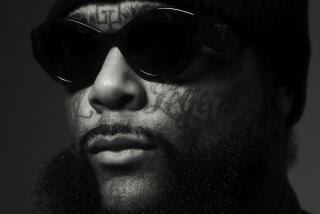POP MUSIC REVIEW : A pair of like-minded folk souls
- Share via
Loudon Wainwright III and Richard Thompson wrapped up their five-week tour as a duo under the ironic title Loud & Rich at UCLA on Friday with a sterling display of songwriting acumen and musicianship -- but one that wasn’t particularly loud or likely to make anybody rich.
Not in the filthy lucre sense, anyway. These two folk-rock veterans appeared long ago to have achieved peace in the knowledge that their astute brand of music fills clubs and theaters, not arenas and stadiums. They’ve been pals at least since the days when Thompson produced a couple of Wainwright’s standout albums in the ‘80s, and they used the occasion of their stop at Royce Hall as part of UCLA Live’s eclectic music series to revel in the richness of words skillfully strung together and married to music that carries those words straight to the heart. And, on more than one occasion, to the funny bone.
In fact, many times during the evening, Elvis Costello’s famous pronouncement -- “I used to be disgusted, but now I try to be amused” -- seemed to be at play, but it was often hard to tell who was on which side of that equation.
Wainwright, perhaps the most adroit humorist in pop music of the last 40 years, opened the three-hour performance with a set heavy on recent-vintage material, including three from his ambitious double album “High Wide & Handsome: The Charlie Poole Project.” That set showcases the music of the influential but largely forgotten early country singer from Spray, N.C., a wisecracking, hard-drinking, banjo-playing troubadour for whom Wainwright, also born in North Carolina, obviously holds an affinity.
The solo format left him without the deft instrumental and vocal support he gets on the album from a broad swath of family (including his kids Rufus, Martha and Lucy), ex-family and friends. But Thompson jumped in to add color on “If I Lose,” bending and sliding steely notes and making his acoustic guitar sound like a dobro.
The songs Poole sang often revolved around family, much as Wainwright’s have since his first album in the early ‘70s. So it all felt of a piece when the 63-year-old reluctant patriarch turned to his own nuclear-family material, such as “Half Fist,” an exercise in extrapolated genealogy in which he attempts to get a bead on the grandfather he never knew by analyzing an old family photo.
In the newer “Dead Man,” Wainwright describes the bittersweet chore of sorting through, and trying on, his father’s wardrobe long after he died, finally realizing “I’ll sleep, dream and die in a dead man’s bed.” Humor doesn’t get much blacker or truer.
Thompson, on the other hand, still sounds pretty disgusted with many facets of life on Earth, notably the antics of megalomaniacal politicians or obsessive-compulsive romantic partners, especially when he’s the obsessive one. That was him in the creepy “Cold Kisses,” going through a lover’s dresser drawers in a desperate search for clues about “the life you led before.”
He also gave the audience a snippet from his commissioned song cycle “Cabaret of Souls,” which he premiered in Pennsylvania in June, with “Time Will Break You,” a bit of wishful thinking about one day seeing life’s wrongdoers get their comeuppance.
Throughout his own set, and when he teamed with Wainwright, Thompson, 60, effortlessly demonstrated why so many guitar lovers consider him among the world’s greatest players.
He coaxed shimmering, pulsating tones from his Lowden guitar and unleashed dazzling solos and fills that somehow never came off like Guitar Hero grandstanding, because they were always inspired by, and in service of, the emotional heart of each song.
In addition to a mid-concert segment when the pair played together, the two teamed up at the end of the show on “Down Where the Drunkards Roll” from the Richard and Linda Thompson days of yore, and then a few covers that displayed their common love for Bob Dylan (“You Ain’t Goin’ Nowhere”), ‘50s R&B; (Jerry Leiber and Mike Stoller’s “Smokey Joe’s Cafe”) and country music (Marty Robbins’ heartbreaking “At the End of a Long, Lonely Day”).
--
More to Read
The biggest entertainment stories
Get our big stories about Hollywood, film, television, music, arts, culture and more right in your inbox as soon as they publish.
You may occasionally receive promotional content from the Los Angeles Times.










